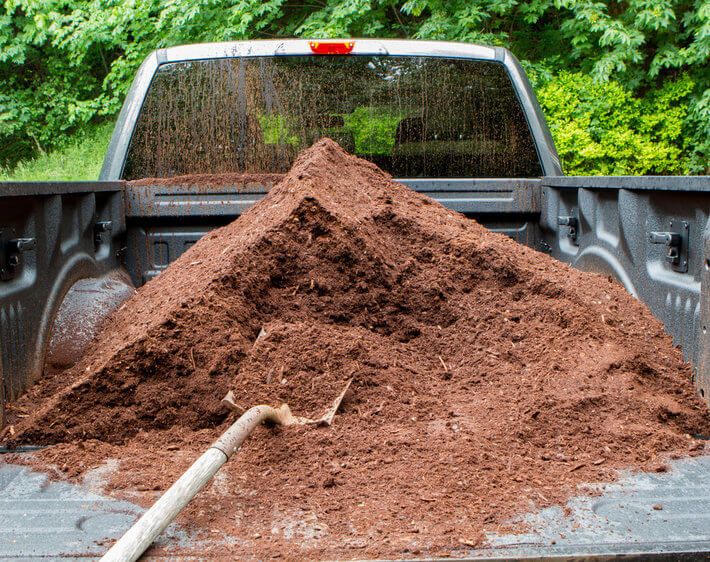Think payload and towing capacity mean the same thing? Think again. One is all about carry, the other all about pull. Learn the key differences between these often misunderstood truck terms so you don’t risk harming your truck or your cargo. It's time to talk truck stuff.
Carry or Pull?
The main difference between payload and towing capacity is fairly simple.
Payload refers to the number of pounds of cargo a pickup truck can carry, and towing refers to the number of pounds a pickup truck can pull.
Payload Capacity: How Much Your Truck Can Carry
Your truck’s payload capacity refers to all the cargo weight that you can safely add in addition to your truck’s empty weight (also known as curb weight). A "payload" could be anything from a truck bed full of garden mulch to five passengers and a week’s worth of luggage.
Payload capacity is calculated by your vehicle manufacturer and noted in the owner's manual. But you can calculate your truck's payload capacity on your own by doing a little math:
Start with the maximum total weight your truck can handle, known as its Gross Vehicle Weight Rating (GVWR). GVWR is also determined by the manufacturer and is listed in your owner's manual. Subtract your truck's curb weight from its GVWR—that's your payload capacity!
Payload Capacity = Gross Vehicle Weight - Curb Weight
For example, if your truck's GVWR is 9,000 lbs and it weighs 5,000 lbs empty, then your payload capacity is 4,000 lbs. You can put 4,000 lbs of people and stuff in your truck.
Note: Payload capacity includes passengers! If you’re picking up a couple of friends, you may need to drop cargo to stay within your truck’s weight limit.
Here are some common payloads that you might carry with your truck:
- One-quarter cord of firewood (1,250 lbs)
- One-half cubic yard of sand (1,300 to 1,500 lbs)
- One-half cubic yard of gravel (1,200 to 1,450 lbs)
- One-half cubic yard of mulch (300 to 400 lbs)
- One-half cubic yard of dirt (1,000 lbs)
Towing Capacity: How Much Your Truck Can Pull
Towing capacity refers to how much weight you can safely pull behind your truck with a trailer. Typically, your truck’s towing capacity far exceeds its payload capacity because the majority of the weight is resting on the trailer axles, not your truck’s axles.
You can find your truck's towing capacity in the owner's manual or calculate it on your own. To find your truck’s towing capacity, subtract your truck’s curb weight from its Gross Combined Vehicle Weight Rating (GCVWR). The GCVWR is the maximum weight of your loaded truck and the weight of its attached trailer.
Towing Capacity = Gross Combined Vehicle Weight - Curb Weight
Let's say your truck has a GCVWR of 15,000 lbs. It weighs 5,000 lbs empty and you already have 4,000 lbs of dirt in the truck bed. Your towing capacity would be no more than 6,000 lbs.
Here are some items you might tow, along with their common weights:
- Car (2,800 lbs)
- Car trailer (1,600 to 2,000 lbs)
- Motorboat (2,500 lbs)
- Boat trailer (300 to 1,500 lbs)
- Camper (5,200 lbs)
Payload vs. Towing Capacity Example: 2018 Chevy Silverado
The payload capacity of a 2018 Chevy Silverado truck ranges from 1,739 to 2,018 lbs. Remember, this amount refers to how much weight you can add without a trailer.
As for towing capacity, a 2018 Chevy Silverado can tow anywhere from 7,600 to 23,000 lbs, depending on how the truck is configured, notes Chevy.
If all these numbers have you "tow" excited, read on! When equipped with an EcoTec3 5.3L V8, the 2018 Chevy Silverado 1500 pickup can safely tow up to 9,800 lbs.
Meanwhile, the towing capacity of the 2018 Chevy Silverado 2500HD Gas is 14,500 lbs. And the Chevy Silverado 3500HD Duramax® 6.6L Turbo-Diesel V8? It can tow up to 20,000 lbs—almost two adult elephants!
Even Chevy’s smaller pickup model, the 2018 Chevy Colorado, can tow up to 7,700 lbs if equipped with a Duramax®2 2.8L Turbo-Diesel engine.
Know Before You Tow!
Ignoring your truck’s towing and payload capacity is one of the easiest ways to damage its frame, engine, transmission, and tires. Consult your owner's manual before pushing, pulling, or hauling any load.
Proper hauling, based in part on the stability of your cargo, can also prevent crashes. A study by the AAA Foundation for Traffic Safety found that from 2011 to 2014 in the U.S., road debris—including improperly loaded cargo—was a factor in an estimated average of 50,658 crashes per year, causing 9,805 injuries and 125 deaths.
If your truck has sustained damage due to improper hauling, the pros at your local Firestone Complete Auto Care can diagnose any problems, repair the damage, and get you and your truck back to work as soon as possible. Even if your truck just needs a good ol' pick-me-up or routine maintenance, bring it to your local Firestone Complete Auto Care.



